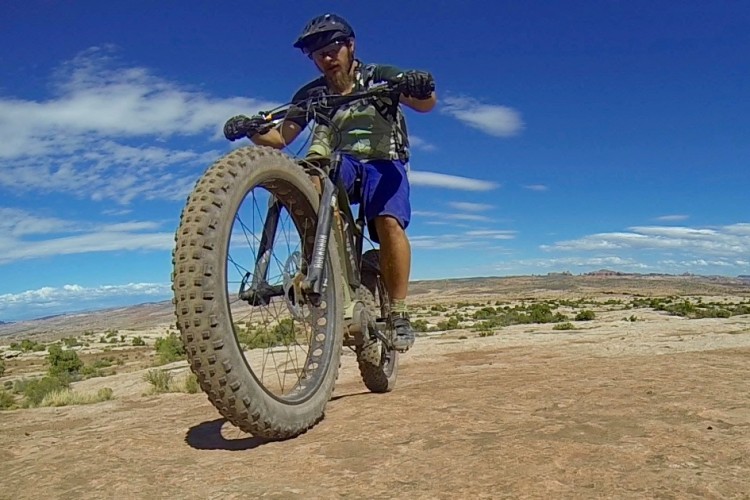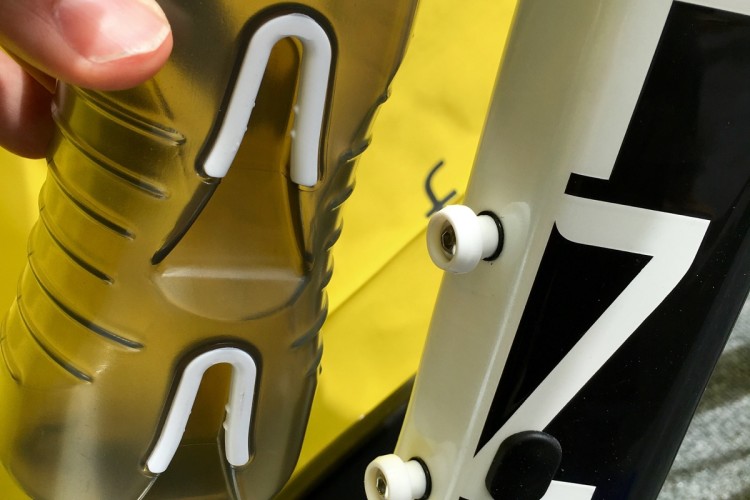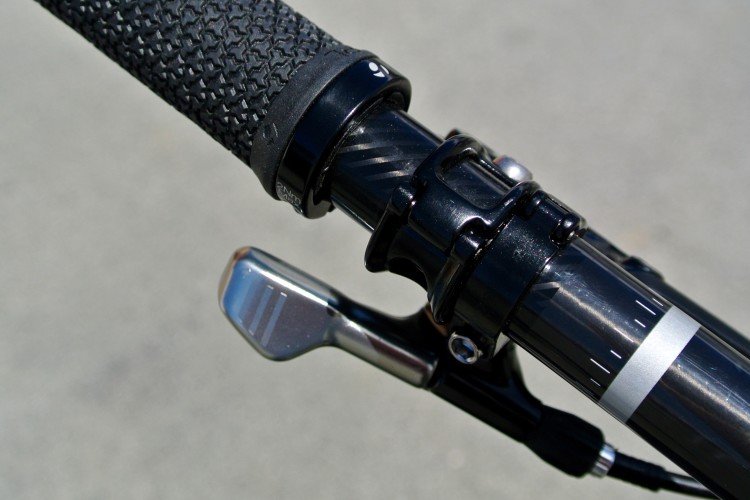Mountain biking, like many modern sports, is built on a foundation of continuous technology improvements and electric mountain bikes are just another development in that progression. It’s unfair to discriminate against trail users based on the equipment they choose to utilize and it’s hypocritical for mountain bikers–long blocked from trail access by ultra low-tech hikers–to discriminate against riders who choose to utilize the latest technology out on the trail.
Perhaps the easiest argument to make against electric mountain bikes is that they’re motorized and there is a long precedent for distinguishing between motorized and non-motorized trail use. But the most often-cited reasons for that distinction–noise and trail damage–don’t apply to electric mountain bikes. The latest e-MTB models are silent and don’t feature a throttle, making it nearly impossible to break traction, let alone cause the type of trail damage normally associated with motorized off-road vehicles. Electric mountain bikes are also much lighter than gas-guzzling dirt bikes, which keeps their impact on par with the mountain bikes already on the trail.
Proponents of e-bikes talk about the potential to expand the sport of mountain biking which is good or bad depending on how you look at it. But consider the types of riders e-bikes can potentially put on the trail: older riders who don’t have the same power they used to, people with physical handicaps, or mountain bikers recovering from injuries. Banning anyone from a trail based on their abilities or inabilities is obviously a non-starter.
Adaptive mountain biking is well established and adding an electric motor is just another adaptation some riders may need to help them on the trail. It’s a slippery slope to start designating which bike technologies are allowed on the trail and which ones aren’t. Banning electric drivetrains would be like banning hydraulic disc brakes on certain trails because they’re too easy to operate compared to rim brakes. Insane!
Electric mountain bikes are heavier than their cross-country equivalents (though similar to many DH sleds) which some have argued makes them potentially dangerous on backcountry trails where a failed battery can leave an unfit rider stranded miles from the nearest exit point. The argument goes that e-bikes shouldn’t be allowed on these trails because they can be dangerous for unprepared riders and potentially increase search and rescue costs for emergency responders.
This is true: e-bike riders need to be responsible, but in the same way all mountain bikers do. A trip into the backcountry without a spare tire or pump is potentially disastrous with or without an electric drivetrain. Yet, you won’t see a note at the trailhead requiring riders to carry emergency items in their packs or barring riders who choose to go out unprepared. Personal responsibility remains in effect for everyone. [In fact, many communities already charge individuals for a rescue if it’s determined the individual should have made more adequate preparations.]
But say the battery didn’t run out and instead, the rider lost one pedal (this has happened to me) or injured a leg. With power assist, an e-bike ends up assisting in a rescue rather than necessitating one. Now I won’t go so far as to say every bike should be equipped with an emergency battery but that’s food for thought.
Finally, some may argue about potential collisions and conflicts between e-bike riders riding along at much faster speeds than their non-assisted brothers and sisters. For this reason, the argument goes, e-bikes should not be allowed on the same trails as regular mountain bikes. In reality, e-bikes include speed governors with even the most liberal government-mandated caps landing at 28mph or less. Even then, riders need to put in a significant effort to reach those speeds. Fast riders and slow riders have been sharing the trails for decades and we’ve even established etiquette like downhill riders yielding to the (slower) rider who is climbing. While some e-bike specific norms may need to be established, the differences between e-bike and non-e-bike riders are not so significant that they can’t share the trails.
Adding an electric drivetrain to a mountain bike is no different than kitting a rig with the latest tech in suspension or even hydraulic disc brakes. We all ride for the same reasons–fun, exercise, and experiencing nature–so everyone deserves access to the same trails without regard to the equipment they need or prefer.
This is just one side of the debate. Be sure to read Greg’s article, arguing against e-assist mountain bikes on mountain bike trails.













16 Comments
Jan 29, 2014
Hi Dennis, It is marvellous that you are able to maintain an active outdoor life into your seventh decade. I accept the points ( to a degree) in your counter argument but am also relieved that you don't take a definitive position on the controversy.
If you strip out the emotional elements from the debate and focus on the practical and physical aspects, then its very difficult, if not impossible, to reason for exclusion of pedal assistance limited to the power of fit rider, which, in the case of my country, is 250 to 300 watts. That's the law down here and anything else is a registered motor vehicle. If you're you're going to prohibit them , you may as well ban tandems.
Like yourself I live an active life outdoors, but I have limitations. My knees. An the irony is, it's probably the continued activity in my younger years, including mountain biking, that has accelerated the degeneration. But I'm not not going to lie down and soak up the emotional drivel that is being dished out in the blogosphere that is attempting to exclude me and a growing number of contemporaries from my outdoor recreation.
My bike, and you can read about it here,
http://s1202.photobucket.com/user/Steveflaunty/media/Mobile%20Uploads/image-2.jpg.html
has absolutely no impact, environmental or otherwise on mountain bike trails. I have to pedal hard uphill but its manageable and I couldn't do it otherwise, the pain in my knees wouldn't allow it. I get a decent cardiovascular workout and downhill the assist is off.
So far, out of the dozen's of riders I've encountered on the trails, only a couple have been astute enough to work out I have assistance. If they had an emotional opinion about it, then they kept it to themselves which is where most of the commentary should remain.
I'm not out there to dent anyone's ego. I'm outdoors because I enjoy the fresh air and our
enviable trail network lacing together a wonderland of pristine bush and forest. This wonderland is there for everyone's enjoyment and the line needs to be drawn at the environmental impact. A true eBike (250 Watts, pedal assist only) is of no consequence alongside a conventional mountain bike. They emit no odour, gas, vapour or smoke, they are noiseless and there is no speed differential. If one wishes to argue the final point, then a lightweight diamond framed dual suspension bike is faster downhill where speed is a real issue. Uphill I go at running pace and everyone else is at walking pace. It balances out.
Nov 11, 2013
Dec 21, 2017
Great podcast... first-time listener. I love pedal assistant mountain bikes and I think that they look amazing and they are a brilliant invention of our species. The podcast just sounds a little buyest to me. My suggestion is that the next episode dedicated to talking about ebikes, that you invite a guest that is in pro ebikes to see what that person would have to say also.
Jan 29, 2014
Call me a throwback purist; the crest of the hill feels better to me when I've pedaled up it. I figure when I can no longer do that, I'll choose gentler terrain. Sorry your knees bother you on a bike; my knees suffer from skiing while a bicycle is tonic.
Nov 11, 2013
Mar 21, 2016
Mar 22, 2016
Essentially there is a lot of misinformation circulating by the traditional MTB community thst is very resistant to change. If you personally give one a go, a prpoer one that is like the Haibije xduro or the specialized levo, then you'll immediately understand the difference. They give just enough pedal assist to relieve your legs and knees of pain but still make sure you have a good aerobic work out uphill. So you enjoy the entire day of riding and no one can srgue with thst unless they are a self flagelating luddite.
Jan 29, 2014
Nov 11, 2013
Ok, so resorts and parks are a special case but what about national forest trails where folks utilize a shuttle to get them to the top (Monarch Crest, The Whole Enchilada, etc.)? If we're going to ban clean, quiet, electric bikes from "self-shuttling" the trails, maybe we should also ban the gas guzzling cars used to shuttle "human-powered" riders to the top of the trail.
Nov 11, 2013
As for e-assist mtbs on private resort land, that's one thing: resorts can already do pretty much whatever they want. I think the bigger issue is access on public lands. But then, what about the resorts that lease forest service land, you might ask? Well, now things are starting to get really sticky, aren't they?
Feb 7, 2022
Nov 11, 2013
I think we really need to keep a distinct line between human powered and any other mode of transportation (including equestrian, for that matter).
Jan 28, 2014
Reading through all of the posts on this website and others there is a common thread running through all of the opposing opinions and that is, they are all predicated on a weak argument of fear underlined with a piousness that is more in keeping with a religous order.
In many cases it stems from a lack of knowledge that breeds the fear.Fear that a monster is being let loose that will escalate out of control. Nothing could be further from the truth. I think enough has been mentioned about the distinction between pedal assist and everything else so I won't bother repeating it. What we are seeing now is a convergence of technology and recreation. It is progress and it will never sleep. All of us at some point in our lives will arrive at that point in the curve where ability forces recreational enjoyment below the base line.
I've been around orthopaedic surgery for over 25 years and as certain as the sun will rise tomorrow you are all going to benifit from assistance if you want to keep up the enjoyment of this marvellous recreational pastime going into your sixth decade and beyond.
So don't shoot yourselves in the foot and begrudgingly challenge the right for others to use eMTB's on the country trails without at least pausing to consider the implications and study the facts as to exactly what this technology is comprised of. I mean some of the comments defy belief..." if it's anything but human powered, it dosen't belong"....." it's got a motor so it dosen't belong"
History has a habit of repeating itself. I distinctly remeber the 1980's when snowboards were banned from most of North America's ski fields. They were the ski slope terrorists of the day.Hell, they were going to strip the slopes of all viable snow. Today acceptance is 100% and hey.... you can even win an Olympic gold!
Nov 11, 2013
May 4, 2016
http://www.singletracks.com/blog/mtb-columns/over-a-beer-why-ebikes-are-the-spawn-of-satan-mostly/
Nov 11, 2013
If these off road mopeds become popular they will destroy bike access. Look at current riding opportunities for bikes and dirt bikes on public lands...
R.IP Mountain Biking
Cause of death: Lack of access, caused by the e-bike